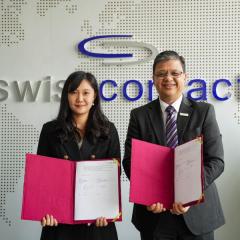University of Queensland alumnus Dr Nigel Greenwood has been globally recognised for building the world’s first genuinely machine-intelligent artificial pancreas.

The leader of Team MachineGenes, and founder of its member AI startups, is now one of the world’s 10 semifinalists in a global challenge to build AI applications to address critical global issues.
The team is one of 683 worldwide who entered the IBM Watson AI XPRIZE competition in 2016. It’s now the only team left that is based outside North America and Europe. The top 10 semifinalists will compete at TED HQ in New York in February 2020, with the hope of winning the US$3 million prize in the finals in April.
Dr Greenwood’s team is demonstrating the diabetes applications of his technology, using evolutionary machine learning and advanced AI to recommend the best insulin dosage to help people control their blood glucose.
“We’ve been using our technology to data mine the individual medical histories of people with diabetes,” Dr Greenwood said.
“Some with ‘brittle’ or highly unstable diabetes have a continuous glucose monitor strapped to their body day and night, and regularly check their blood glucose levels directly by pricking their fingers.
“They have insulin pumps and estimate the carbohydrates in their meals. Instead of forcing people to try and make sense of all this by themselves, all of these data sources are used by Neuromathix software to come up with the best insulin dosing decision.”
The three AI startups that comprise Team MachineGenes are Evolving Machine Intelligence (EMI), Diabetes Neuromathix and Turbine MachineGenes. EMI does pure research into new forms of AI and evolutionary machine learning. Diabetes Neuromathix applies this new technology to helping people with Type 1 diabetes, including those with ‘brittle’ diabetes, while Turbine MachineGenes applies the same technology and techniques to aviation engines.
Turbine MachineGenes was incubated by UQ’s ilab Accelerator program in 2014 and 2015, and remains at the University’s incubator situated at Long Pocket.
UQ has been supporting Dr Greenwood’s recent work, which first began with his studies under renowned mathematician and UQ Reader, Dr Janislaw M Skowronski, 30 years ago.
Last year, UQ and Advance Queensland sponsored Team MachineGenes’ attendance at the United Nations’ AI for Good Global Summit and the world’s top AI conference, NeurIPS 2019.
What does Neuromathix do with the information?
 Real people’s medical histories go first to a high-performance computer.
Real people’s medical histories go first to a high-performance computer.
Here, the best models of Type 1 diabetes from the medical literature are literally forced to evolve by the software until they match the medical histories. The result? Personalised models tailored for that person.
Dr Greenwood’s software passes these models to a tablet computer or similar—that the patient carries around.
Then two AIs, running on the tablet computer, sort through the personalised models and the available information that’s coming in real time and argue in terms of designing an insulin strategy.
One of them, the Prime, tries to design the best strategy it can. The other, the Adversary, tries to make bad things happen. The resulting conflict leads to an insulin strategy being synthesised. Then the person has the final say on the important aspects of this strategy, such as what level of insulin dose they’re happy with, and if necessary can tell the AIs to go back to the drawing board and try again.
“The two AIs churn out a really safe, robust, tested insulin strategy effectively in real time that no human endocrinologist could match,” Dr Greenwood said.
“It will allow for better and more accurate treatment than we’ve ever seen.”
What will Team MachineGenes do if they win the ultimate prize in April?
Winning the XPRIZE competition would enable Dr Greenwood and team to do two things: run a clinical trial out of Westmead Hospital, Sydney, and also continue to develop next-generation machine learning and consequent AI, using a completely different paradigm than the current “gold standard” of neural networks.
“Running a clinical trial would be a massive game changer as that is the final piece in the puzzle,” Dr Greenwood said.
Pro-Vice-Chancellor (Global Engagement and Entrepreneurship) Dr Jessica Gallagher said Team MachineGenes could be the next ‘moonshot’ that uses UQ’s entrepreneurial and research ecosystems to accelerate personalised medicine.
“Dr Greenwood’s decades-long work is now on the brink of making a huge impact for those hundreds of millions of people trying to live well with diabetes,” Dr Gallagher said.
Media: Evolving Machine Intelligence Dr Nigel Greenwood, nigel@machinegenes.com, 0410 477 049.



